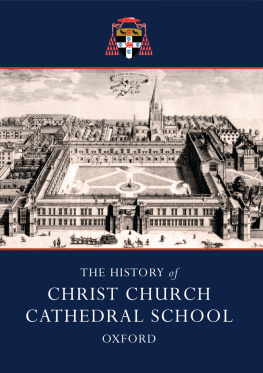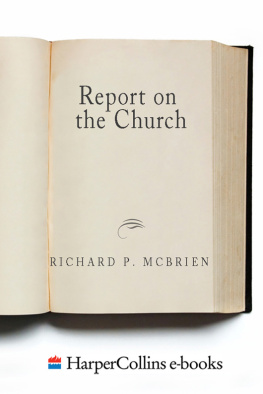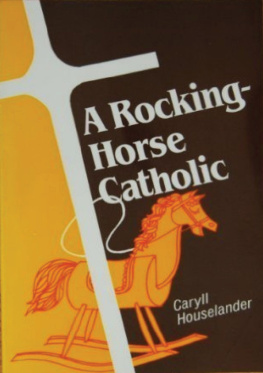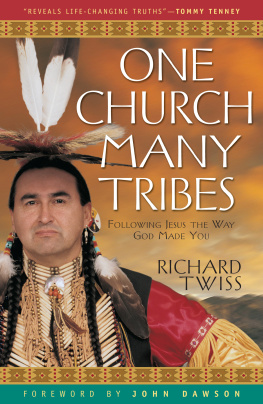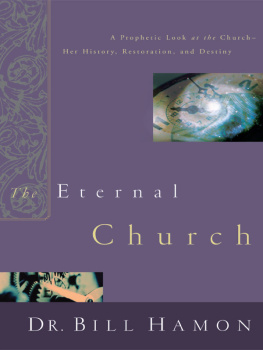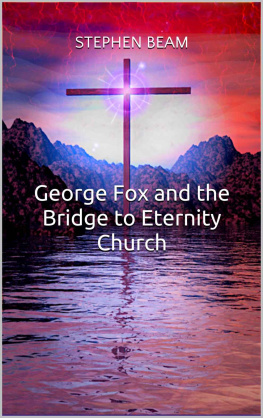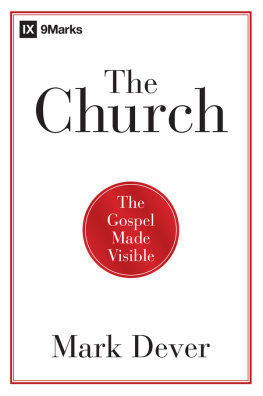OVER THE BRIDGE
An Essay in Autobiography
BY
RICHARD CHURCH

For copyright reasons, any images not belonging to the original author have been removed from this book. The text has not been changed, and may still contain references to missing images.
This electronic edition published in 2015 by Bloomsbury Reader
Bloomsbury Reader is a division of Bloomsbury Publishing Plc, 50 Bedford Square, London
WC1B 3DP
First published in Great Britain in 1955 William Heinemann Ltd
Copyright 1955 Richard Church
All rights reserved You may not copy, distribute, transmit, reproduce or otherwise
make available this publication (or any part of it) in any form, or by any means (including without limitation electronic, digital, optical, mechanical, photocopying, printing, recording or otherwise), without the prior written permission of the publisher. Any person who does any unauthorised act in relation to this publication may be liable to criminal prosecution and civil claims for damages.
The moral right of the author is asserted.
eISBN: 9781448214877
Visit www.bloomsburyreader.com to find out more about our authors and their books You will find extracts, author interviews, author events and you can sign up for newsletters to be the first to hear about our latest releases and special offers.
You can also find us on Twitter @bloomsreader.
Contents
I have left it so that among our passions, among the human problems which we desire to master, to express, to solve, there might always remain one room devoted to the most intense self-recollection. And I truly hope that it is in that room that we shall die.
(Patrice de la Tour du Pin.
From The Correspondence of
Laurent de Cayeux.)
Chapter One
The Aquarium
It was the first of January, 1900: New Years Day; New Centurys Day. But that portentous fact was of no interest to two little boys walking with extreme care and anxiety across Battersea Bridge at half-past three in the afternoon.
Their concern was immediate, for the elder brother, a small fellow of eleven, with a large nose, brown eyes, and a sallow skin that gave him a Spanish cast, was carrying an aquarium.
This task so occupied him that his follower, the brother who shadowed his life, and for whom he usually felt solemnly responsible, was for the moment forgotten.
This did not disturb the junior, for he too was as anxious, and as signally concentrated, as his brother. Though only seven years old, he carried the burden of life with gravity. His nose was smaller than his brothers, and it was somewhat pinched, the nostrils white and enlarged. This made the red cheeks all the more noticeable: and it may have added to the fiery light of his eyes, which were also brown.
Rather short of breath, from excitement and not from haste, he trotted along close to his brother, from time to time putting out a worried hand and grasping the elders coat-tail, only to be shrugged off with a muttered exclamation of Stop it! Youll make me drop it!
He appeared to understand this abruptness, for his brother, always sardonic even in affection, was inclined to be sharply irritable in moments of stress.
And how tense, how critical, was this particular moment! It marked a stage, a peak-point, in their lives. Both had longed, through childhoods infinity of time, for a goldfish. Their father, however, was so boyishly concerned with his own enthusiasms that he had ignored this longing. Their mother was by experience and temperament so generally apprehensive that she hesitated before committing herself, or her children, to the caring for livestock. There was already a cat in the house, and she had made this excuse for banning the buying of a goldfish. She said that the cat would hook it out of the bowl and eat it, thus adding to the general redness and toothiness of nature, under whose menace she was convinced that her two boys were doomed to fulfil their fragile destinies.
This timid philosophy, however, had been shaken by a touch of kindness; and kindness from a humble quarter. One of the fathers many colleagues in the South-West District Post Office had been prematurely pensioned after having his wits permanently addled by a blow on the head from the lid of a post-van. The poor man, semi-speechless and existing in a mental vacuum, fortunately possessed a sensible wife who happened to be handsome in a pre-Raphaelite way. She got a job as caretaker in the house of the American artist Abbey, in Tite Street, Chelsea, where she lived in the spacious basement with her little daughter and her now wholly innocent husband.
The boys father still befriended this man, for he had a strong esprit de corps (a characteristic which will be explained later), and appeared to be personally intimate with several hundred of his fellow mail-sorters in the red-brick building behind Victoria Street, adjoining the site where the Byzantine cathedral of Westminster was at that time being built.
Regular visits were paid to the retired comrade in the comfortable basement in Tite Street, and on occasion the two boys were taken along too, the father having a sentimental pride in his youngsters.
So it was that the craving for a goldfish became known to the wife of the stricken man. She may have spoken to her employer about it, for a message at Christmas had said that if the boys came over the river to Tite Street one afternoon, she would have a surprise for them.
That younger brother being myself, I can now recall, with envy, the shudder of excitement with which I crossed the river that day, chattering to my silent brother, who even at that time was something of an enigma, and an oracle, to me. My attitude was not unusual, for a childs world, while being timeless and spaceless, is also closely hedged-in by fear, brevity of attention, lack of association of ideas and experience, and all the rest of the unattempted potentials of the infant consciousness.
My universe was still centred in my mothers fragrant person: her lap, her caress, her hair and eyes so curiously the same nut-brown colour, warm and glowing. The garments she took offthe apron, the dropped handkerchiefshone for a while with her light, and I would touch them with rapture, beside myself with love. She and these detachable attributes were like the sun and his flakes of fire. The further I got from her, the colder and darker fell my living days and nights. And the fall was rapid: so small was my own supply of vitality, the confidence of flesh and bone.
Thus my realisation of the outside world was confined to a few streets around our little semi-detached house in the marshes of Battersea, between the famous park and the old parish church that stood out on a curve in the river. I seldom ventured as far as the park or the church; they were shadowy, foreign. A vague obscurity closed about me much nearer home. I doubt if, at that age of seven years, my world was more than a quarter of a mile in radius, though I was frequently carried beyond that small area of light by my parents, the outer dimness being penetrated during such excursions by the all-powerful light-beams of their divine authority.
A lesser power, but wholly trustworthy, was my brother Jack, whose taciturnity I took for granted, never questioning the oddness that made this lad of eleven so different from both our parents. They were happy people; my father a perpetual boy he seemed to be a creature released, like a colt from a stable, and he galloped about the paddock of life with a thunder of hoofs and a flashing of nostrils, drinking the very air and intoxicating himself on it.


